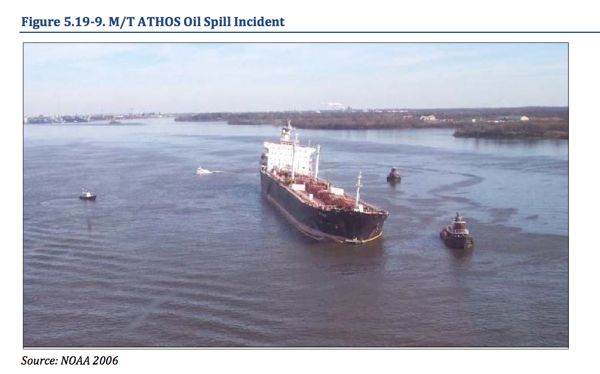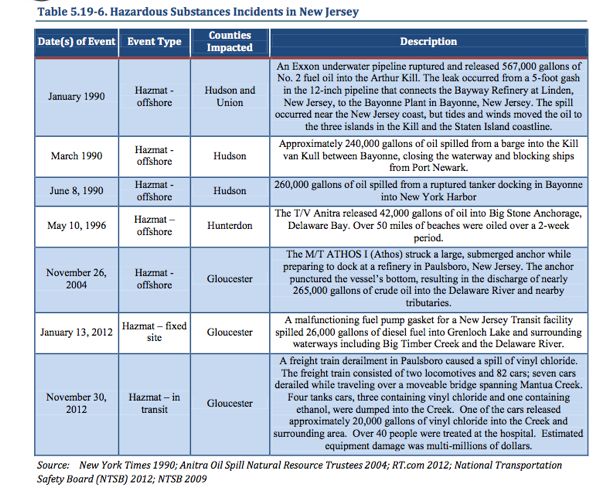NJ’s Cap on Pollution Liability Exposes The Public and Taxpayers to Toxic Risks
Cap Creates Huge Orphan Liability for Pollution Damages from Spills and Accidents at chemical facilities, refineries, pipelines, ports, and rail & truck transport
Cap shifts risks of accidents and the economic costs to the public and taxpayers, not the polluters
Proposed Legislative Fix Is Far Too Narrow in Scope
On November 26, 2004, the M/T ATHOS I (Athos) struck a large, submerged anchor while preparing to dock at a refinery in Paulsboro, New Jersey. The anchor punctured the vessel’s bottom, resulting in the discharge of nearly 265,000 gallons of crude oil into the Delaware River and nearby tributaries (National Oceanic and Atmospheric Administration [NOAA] 2006).
Although you would not know about it by reading the NJ media, last Monday (6/16/14) the Senate Environment Committee heard testimony on and released an important bill to eliminate the current $50 million liability cap on pollution discharges from off shore drilling platforms that enter NJ waters, see, S2172 (Smith, D-Middlesex).
The bill is limited in scope to drilling platforms and is a significantly scaled back version of a bill (S2108) originally introduced in the wake of the Gulf of Mexico oil well blowout. That bill would have applied to far more hazardous activities. It was heard in July 2010 and I wrote about it here:
A far narrower compromise version of that bill passed both houses of the legislature by unanimous votes, but was pocket vetoed by Governor Christie in January 2012. The Governor did not even explain why he effectively vetoed the bill.
The saga of how that original bill got scaled back to the current version – the legislative history – shows how powerful the oil, gas, and chemical lobby is in Trenton and how they act with impunity to harm the public interest and maintain huge subsidies.
Risks from accidents and spills at hundreds of industrial chemical facilities, refineries, ports, pipelines, ships & barges, railroads, and tanker trucks were carved out of that bill and ignored. Someone should ask the people of Paulsboro about that – or those on the Delaware who experienced the Athos spill (see photos above). See also:
Industry lobbyists effectively gutted the bill and legislators went along for the ride. And all of it was done under the radar and unreported by NJ media. see:
- Why the liability scheme is increasingly important
The liability scheme plays an important role in our overall environmental management framework.
Holding corporations legally liable for harms they cause provides incentives to prevent accidents, reduce risky behaviors, and deter illegal conduct. It also provides a means to force polluters to restore damages that they create and compensate the public for harms caused by their pollution. Last, liability can also punish reckless or illegal conduct.
As the lobbyists for corporate polluters exercise an effective veto power over passing new laws to close loopholes and strengthen our laws, and as they capture government agencies, and as our environmental laws and the government agencies that enforce those laws come under increasing attack – as regulatory protections are rolled back or not enforced – the liability scheme becomes increasingly important.
- Drilling platforms are not the only risky activities that threaten NJ
According to the NJ Hazard Mitigation Plan (Section 5.19 Risk Assessment of Hazardous Substances):
If released or misused, hazardous substances can cause death, serious injury, long-lasting health effects, and damage to structures and other properties, as well as the environment. Many products containing hazardous substances are used and stored in homes and these products are shipped daily on highways, railroads, waterways, and pipelines.
Transportation of hazardous substances on highways involves tanker trucks or trailers, which are responsible for the greatest number of hazard substance release incidents. New Jersey is composed of over 39,213 miles of highway, many of which are used to transport hazardous substances (New Jersey Department of Transportation [NJDOT] 2013). These roads cross rivers and streams at many points; hazardous substance spills on roads have the potential to pollute watersheds that serve as domestic water supplies for parts of the State. Potential also exists for hazardous substance releases to occur along rail lines as collisions and derailments of train cars can result in large spills.
In addition to transport risks, NJ has hundreds of chemical facilities and refineries where a catastrophic accident or release of toxic chemicals could kill thousands of people living nearby and cause major environmental damage. See:
According to the plan, from 2008 – 2012 – just 4 years – there were 1,795 accidents involving releases of hazardous substances. While most were small in scale, that is an indicator that risks are significant and increasing in frequency, so a big accident is more likely.
These risks are greatly increasing, as more oil and gas pipelines are built, and hundreds of barges of Bakken crude oil ply the Hudson River and rails en route to NJ refineries.
Ironically, the proponents of the Pilgrim Gas line highlight the risks of shipping Bakken crude down the Hudson River to justify their allegedly less risky pipeline proposal.
In the event of a major accident, the current $50 million liability cap would not come close to paying for the damage done.
The cap does not provide adequate incentive for industries to make the maximum feasible investments in prevention – it actually encourages and subsidizes risky behaviors.
That liability cap shifts both the risks of accidents and the economic costs to the public and taxpayers, not the polluters.
- Where do we go from here?
At the close of my testimony at Monday’s hearing where I strongly urged that the original broad approach to eliminate the liability cap for all discharges under Spill Act be restored – including inland waters and facilities, not just off shore drilling platforms – Chairman Smith signaled an intent to introduce additional legislation to address those risk.
Let’s hope Smith moves expeditiously in drafting and moving that bill.
But, we’ve heard that commitment by Smith before. Back in July 2010, Smith pledged to amend the bill on the Senate floor, as I wrote then:
Chairman Smith announced a plan to release the bill and then amend the bill on the Senate floor on August 23 to address the inland liability issues. The bill was approved unanimously with that understanding.
The bill was amended on the floor alright, but not the Senate floor, but in the Assembly by fellow Democrat and “pro-environment leader”John McKeon (“Got water”, John?)
And it wasn’t strengthened. It was gutted.
The Assembly floor amendment sponsored by McKeon gutted the bill and limited it in scope to the drilling platform bill we have today.
So, I am not optimistic. But hey, Smith and McKeon are loved.

